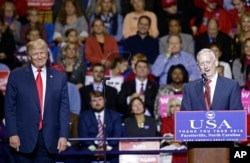Donald Trump’s stated non-interventionism irks hawks on Capitol Hill and could split Republican lawmakers when the president-elect becomes America’s commander in chief next month.
“You’re going to be involved [in foreign conflicts] whether you want to be or not,” Republican Senator Lindsey Graham of South Carolina told VOA, providing what he described as his “two cents” of advice for Trump.
“You can’t defeat radical Islam from our shores. You have to be on the ground over there [abroad]. And you can’t maintain victory without a follow-on [military] presence,” added Graham, a long-serving member of the Senate Armed Services Committee.
Speaking in North Carolina Tuesday, Trump said he does not want to have American forces fighting "in areas that we shouldn't be fighting in” and that a "destructive cycle of intervention and chaos” must end.
"We will stop racing to topple foreign regimes that we know nothing about, that we shouldn't be involved with," Trump told supporters at a post-election rally.
The president-elect also formally announced he has chosen retired Marine General James Mattis as his nominee for secretary of defense.
Mattis, who earned the nickname “Mad Dog” during his service, is no stranger to U.S. military interventions. He commanded a Marine division during the 2003 invasion of Iraq and later oversaw U.S. operations in Afghanistan and Iraq as head of U.S. Central Command.
“Obviously he [Trump] knows what he’s getting with General Mattis,” said Republican John McCain, chairman of the Senate Armed Services Committee. “I know him very well. General Mattis and I share the same view about the importance of American leadership.”
While not directly criticizing Trump’s non-interventionism, McCain said a more assertive U.S. role on the world stage is needed.
“The failure of this president [Barack Obama] to lead has led to 500,000 killed [in Syria] and six million refugees,” the Arizona senator said.
Some Republicans are taking a wait-and-see approach on how Trump will perform as commander in chief.
Senator Roy Blunt of Missouri said Trump’s non-interventionist message “is not inconsistent with anything the president-elect said during the campaign. If the president-elect’s position is that we shouldn’t intervene just because we can, of course that’s right.”
Other Republicans warmed to the president-elect’s message.
“Common sense and smart” is how Alabama Senator Richard Shelby described Trump’s statements on U.S. military might.
“We can’t govern the world. We don’t want to govern the world. We don’t want to be the world’s policeman,” Shelby added.
Non-interventionism is more commonly advocated by left-of-center Democrats than right-leaning Republicans.
But Democrats who agree, at least conceptually, with Trump’s anti-regime change message told VOA they do not trust the messenger.
“When George W. Bush was running [for president] in 2000, he told us he wasn’t going to be toppling any regimes, either,” said Connecticut Senator Chris Murphy. “And then he put a bunch of people in the Defense Department who were committed to toppling regimes.”





